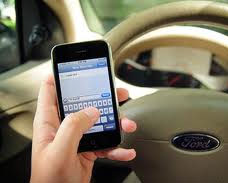
By Lindsay Hornell, BSW, B.A., Graduate Research Assistant in Human Development and Family Studies
Colorado State University

In June of 2011 over 196 billion text messages were sent or received in the United States alone. This shows how text messaging has become one of the most common forms of communication. Text messaging is a great alternative to making a phone call, or if you just need to send a quick message to someone. However, texting while driving can be incredibly dangerous and even lead to fatal car accidents for the driver, passengers, and bystanders.
Texting while driving is considered a form of distracted driving. Other forms of distracted driving include eating or drinking, using a navigation system, adjusting the radio, and even talking to other passengers. However, texting while driving is one of the most dangerous distractions. When a person is sending or receiving a text, it requires visual, manual, and cognitive attention from the driver. In fact, when sending or receiving a text, a person's eyes on average are taken off the road for a total of 4.6 seconds. Going 55mph, that is equivalent to driving an entire football field, blind. For this reason, texting while driving creates a crash risk 23 times more likely than driving while not distracted.
Currently, motor vehicle crashes are the leading cause of death for teenagers in the United States. In the past 5 years, 35,000 teens have died from automobile accidents. That means 18 teens die each day from car accidents. As a grandparent raising your grandchild, it is imperative to teach your teenage grandchild the dangers of texting and driving. Shockingly, over 75% of teens admit to texting and driving. With such high numbers of teens engaging in such dangerous driving habits, here are some suggestions to encourage your grandchild to avoid texting and driving:
For more facts on the dangers of distracted driving click here.
Information and Statistics provided by www.distraction.gov and www.dosomething.org
Copyright © 2025 - All Rights Reserved - Colorado State University
CSU Extension | Equal Opportunity | Disclaimer | Privacy | Apply to CSU | CSU Home